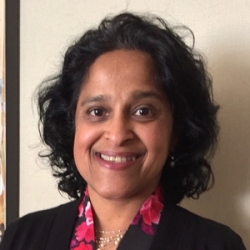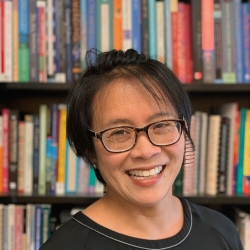The Master of Arts in English provides students with a solid grounding in theory, research, and practice of teaching English as a second or international language to diverse language learner populations.
The Teaching English to Speakers of Other Languages (TESOL) program founded in 1964, is one of the longest running of its kind. This award winning program has a double emphasis:
- Theoretical foundations and contemporary research in linguistics, sociolinguistics, second-language acquisition and related fields.
- Classroom teaching methodology and reflective teaching practice suitable for adult second-language learners.
In the culminating experience class (English 895), students create a digital portfolio containing a capstone project paper, a statement of teaching philosophy, a diversity statement, teaching materials, as well as other materials relevant to their professional growth and careers.
Because our graduates go into so many teaching contexts, the TESOL program does not attempt to train for one specific type of locale; instead, we provide general preparation for the teaching of adult learners in a variety of pedagogical settings.
Contact Information
Dr. Priya Abeywickrama, TESOL Coordinator
Email: abeywick@sfsu.edu
Phone: (415) 338-3095
Office: Humanities 269
Cynthia Losinsky, English Graduate Programs Coordinator
Email: cynthial@sfsu.edu
Phone: (415) 338-2660
Office: Humanities 490
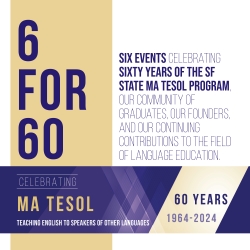
Join us for MA TESOL – in person and virtual events
MA TESOL 6 for 60:
Six events celebrating sixty years of the SF State MA TESOL program, our community of graduates, our founders, and our continuing contributions to the field of language education.
Join us for any or all of these events to reconnect with the program, meet faculty old and new, network with fellow alums and share your experiences since graduating from the program.
- We are located in an exciting urban area. The program maintains vibrant relationships with ESL programs throughout the San Francisco Bay Area, including community colleges, adult schools, and community based programs, providing rich opportunities for practical experience and mentoring, and for grounding student projects in real teaching contexts that fit student interests and career goals.
- The American Language Institute, an intensive English program on the SF State campus often hires TESOL students, providing opportunities for additional training and professional experience.
- We have a long, distinguished history and faculty with an outstanding reputation for leadership, professional scholarship, and service in TESOL. The SF State TESOL degree is widely recognized and respected around the world.
- The U.S. State Department has recognized the TESOL Program with an English Language Fellow Top Producing Institution Award, an award presented to five institutions that have prepared the largest number of TESOL professionals to become English Language Fellows. Fellows are cultural ambassadors who promote English language learning and mutual understanding through cultural exchange on 10-month fellowships around the world.
- Our commitment to academic training in the study of language, literacies and the immigrant experience have led many of our alumni to integrate their professional expertise and cross-disciplinary thinking with meaningful civic action: Maria Jose Bastias, (MA '18) has been recognized for her service to the immigrant community with her work at the community-based organization, Mujeres Unidas Y Activas, and was featured in the New York Times . Vera Rapcsak, (MA '18) and founder of Cosa Buena a social impact organization based in Oaxaca, Mexico offering travel programs that foster authentic, equitable, and respectful cultural exchange, was featured in Architecture Digest.

The photos show the English Language Fellow program's 50th anniversary and at the Anniversary Celebration on Tuesday, November 5, 2019, in Washington, D.C. Dr. Maricel Santos representing SF State’s TESOL Program received the award.
Degree Requirements (30 units)
Core Curriculum (15 units)
- ENG 702: Introduction to Graduate Study of Composition, Linguistics, and TESOL
- ENG 707: Topics in Language Analysis (Variable Topics)
- ENG 728: Topics in Sociolinguistics (Variable Topics)
- ENG 733: Student Teaching Seminar
- ENG 895: Field Study or Applied Research Project
Concentration Curriculum (12 units)
- ENG 731: Seminar: TESOL Listening and Speaking Skills
- ENG 732: Seminar: TESOL Reading and Writing Skills
- ENG 734: TESOL Curriculum and Assessment
- ENG 826: Second Language Acquisition
Electives (ONE minimum - 3 units)
- ENG 724: Special Topics in TESOL (e.g. Tech, Teach Abroad, Research)
- ENG 726: Practicum (if less than 2 yrs teaching experience)
- ENG 736: Seminar: Teaching ESL in the Community
- ENG 738: Pragmatics and Oral Skills
- ENG 832: Seminar in Immigrant Literacies and Community-Based Projects
The Culminating Experience is fulfilled by ENG 895 or ENG 898 Master's Thesis (with consent of advisor).
Deadlines
Applications for Fall admission: Accepted starting October 1 – early deadline February 1, regular deadline April 1, and final deadline July 31.
Applications for Spring admission: Accepted starting August 1 – early deadline November 15, regular deadline December 1.
Requirements
Admission to the M.A. TESOL program is based on evaluation of the following:
- Completion of general admission requirements, as stipulated by SF State’s Division of Graduate Studies
- The quality of the applicant’s academic record.
- Completion of a B.A./B.S. degree from an accredited four-year college or university. Many of our applicants are English majors; however, a B.A. in English is not required. We consider applications from interested candidates with a B.A. or B.S. in diverse fields.
- Minimum Grade Point Average (GPA) of 3.0 (B) or higher, in the last 60 units of undergraduate (and post-baccalaureate) study.
- A statement of purpose which indicates why graduate work in SF State’s M.A. TESOL program is appropriate for the applicant's current academic interests and future academic and professional goals.
- Letters of recommendation are not required but are strongly recommended if the applicant's academic record is not strong.
- The GRE is not required.
- Prior teaching experience is strongly desired but not required.
Admission Procedures
Please review before applying: Graduate Studies Application for Admission Instructions.
International Applicants: also see Graduate Studies International Admissions
Western Regional Graduate Program (WRGP): Alaska, Arizona, California, Colorado, the Commonwealth of the Northern Mariana Islands, Guam, Hawaii, Idaho, Montana, Nevada, New Mexico, North Dakota, Oregon, South Dakota, Utah, Washington, and Wyoming can now pay in-state tuition in the M.A. TESOL program. Please see website for more information.
The application process for the M.A. TESOL program is as follows. If you have questions about the process, please email English@sfsu.edu.
- Complete the online application through Cal State Apply.
Create your account AND Complete your profile.
TIP: Students who will study on a F1/J1 visa must select Non-Resident for U.S. Citizenship Status under your Extended Profile.
Please note: You will only see a list of programs that aligns with your academic degree objective. - Submit the following online (A-C) by uploading on the Cal State Apply site’s “Program Materials” section:
- A copy of your current résumé.
- A 750-word statement of purpose, in carefully written academic prose, that explains your motivations for pursuing graduate studies in Teaching English to Speakers of Other Languages (TESOL) at San Francisco State University, and your future academic or career objectives. To help the admissions committee members understand who you are, please use specific examples and respond to one of the prompts:
- Prompt A; Discuss your experience as a language learner and the specific ways this experience has shaped your goals and beliefs as a language teacher.
- Prompt B: Discuss your prior teaching/tutoring experience and the specific ways this experience has shaped your goals and beliefs as a language teacher.
- Prompt C: Discuss something you have recently read about language teaching/learning and the specific ways the reading prompted you to reflect on your goals and beliefs as a language teacher.
- Please indicate in your statement of purpose which prompt you chose.
- Please upload legible unofficial copies of transcripts from each college or university attended. Including study abroad coursework, or community college coursework, even if this coursework appears as transfer credit appears on your degree transcript. Full academic disclosure is required. Photographs or screenshots of transcripts will be rejected. An incomplete academic history will significantly delay review of your application. The Division of Graduate Studies may request official transcripts from you at any point during the application review process.
- If selected for admission, you will be required to submit official transcripts to the Division of Graduate Studies in order to secure your offer of admission. Please note: if you previously attended SF State, you do not need to submit a SF State transcript.
If selected for admission, please mail official transcripts to:
Graduate Admissions Office, ADM 250
San Francisco State University
1600 Holloway Ave.
San Francisco, CA 94132 - International applicants who are non-native speakers of English must also have official TOEFL scores sent (institution code: 4683, department code:14). IELTS scores are also accepted. ETS is now providing an at home TOEFL test during the COVID-19 pandemic.
International applicants who are non-native speakers of English must also submit a certified financial statement. - Optional letters of recommendation from instructors or other persons qualified to comment on your ability to succeed in graduate studies. Because admission to the program is competitive, recommendation letters can help to support your application. There is no standard recommendation form; recommenders should simply use letterhead and address letters to "M.A. TESOL Admissions.” Use the Evaluations tab to manage submission of letters of recommendation. Letter writer email addresses should be from professional or academic organizations (ex. @sfsu.edu, @CA.gov or @ibm.com), not personal email addresses. Cal State Apply instructions on how to submit letters of recommendation.
International Applicants
Submit supplemental application material via mail and within a month of the application deadline. Per university policies, international students are required to show sufficient funding to cover the first year at the time of application. The English Dept. has limited financial awards for graduate students.
The time to process documents for international student visas can be lengthy, so it is very important to submit complete applications (with all required documents including official transcripts from all universities, official TOEFL score, and the fee) as early as possible.
For advising and assistance, please see the University Bulletin or contact the following offices:
Office of International Programs
Phone: (415) 338-1293
Email: oip@sfsu.edu
Division of Graduate Studies
Phone (415) 405-4005
Email: gradstudies@sfsu.edu
Required Tests
The GRE is not required for admission to the SF State TESOL program.
Level I Writing Proficiency is determined on the basis of the statement of purpose submitted as part of the application for admission.
Those students whose academic writing is not strong enough may need to take English 670 (Graduate Writing) during their first semester or in a subsequent semester.
Students whose native language is not English and whose B.A. was completed outside the United States must present evidence of language proficiency either with TOEFL or IELTS scores as indicated below:
| TOEFL | IELTS (Academic) |
|---|---|
|
|
ETS is providing and an at home TOEFL test during the COVID-19 pandemic.
A TOEFL score of 95, or an IELTS score of 7.0, is considered to be minimal; applicants who demonstrate stronger English proficiency with a higher TOEFL or IELTS score (and higher writing subscores) will have a better chance of being recommended for admission to the Master of Arts in English with Concentration in TESOL.
The TOEFL or IELTS is not required for non-native English speakers who completed their Bachelor’s degree in the U.S. or another English-speaking country.
However, applicants who obtained a B.A./B.S. from an American university in a major other than English might consider submitting a recent TOEFL or IELTS score as evidence that their language proficiency is strong enough to do graduate study in an English Department.
If you do not meet the minimum TOEFL or IELTS requirement, you CANNOT be admitted conditionally to the M.A. TESOL program. To build your English proficiency and academic skills in preparation for graduate study, consider studying at the American Language Institute on the SF State campus where you will have opportunities to prepare for and take the TOEFL, to improve lecture listening and note-taking, oral presentation, and academic reading and writing skills, and to become oriented to the American educational system.
Transferring Credits
The M.A. TESOL Program is 30 semester units (10 courses). The University will accept a maximum of 9 semester units, including any combination of transfer units from another institution or coursework through the College of Professional & Global Education and included on a student’s Advancement To Candidacy (ATC). Transferable courses must be upper-division or graduate-level classes taken after completion of the student’s B.A., not counted for another graduate degree (units cannot be double-counted), relevant to TESOL and recent (taken within seven years of the semester when the student plans to graduate).
SF State will not accept units from another university if that university does not accept the units for its own advanced degree programs. Because courses taken as part of a certificate program are usually not regular academic courses that count towards a university degree, such courses usually cannot be transferred. If you wish to transfer courses taken at another university (typically, for electives), see an advisor about filing a Graduate Transfer Unit Evaluation form for approval of these courses.
If you were admitted to SF State's M.A. TESOL program before Fall 2019, please view the advising instructions.
Academic Advising
Advising is central to the program. Students in need of advising have a number of options:
- Review the extensive advising information on this website.
- Contact your assigned faculty adviser and set up an appointment ( in person, via e-mail or over the phone).
- Attend Advising Days. Advising Days provide students with the opportunity to meet with faculty and attend various information workshops.
- M.A. TESOL students preparing for Advancement To Candidacy (ATC) please view advising section below (includes capstone preparation process as the capstone proposal is due at the time of ATC).
- For serious academic concerns, including academic probation, please contact the program coordinator (matesol@sfsu.edu).
Find your Faculty Advisors:
- If your last name begins with A - L, please see Dr. Kohls or Dr. Santos.
- If your last name begins with M - Z, please see Dr. Abeywickrama or Dr. Olsher.
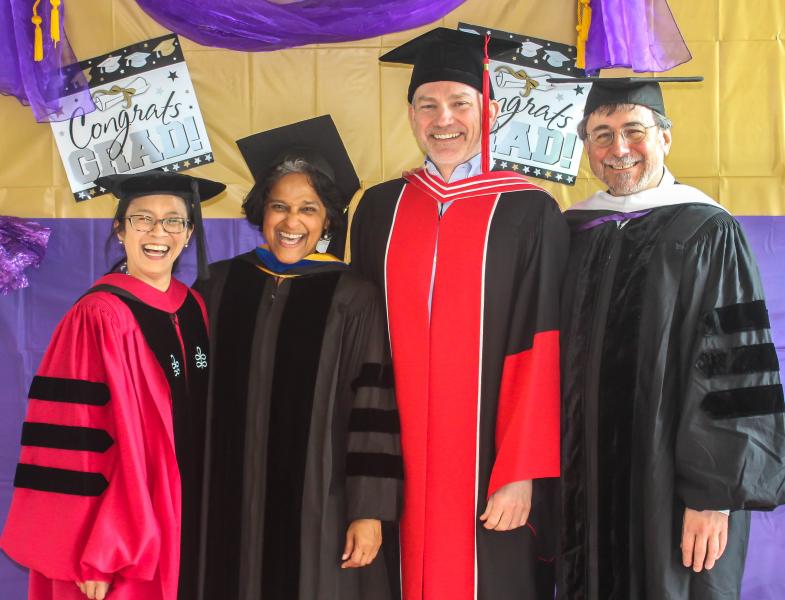
Academic Policies and Resources
The University Bulletin includes official graduate academic policies and procedures. It also provides a wealth of other information (see Table of Contents), including the official requirements of the M.A. in English: concentration in TESOL degree program and course descriptions.
The Division of Graduate Studies (Administration 250, (415) 338-2234, (415) 338-2232, gradstudies@sfsu.edu) provides advising resources, forms for continuing students and information for current students.
Length of Program and Course Sequence
The entire M.A. TESOL program, including recommended courses taken during the first semester or two, takes from 2-21/2 academic years (four or five semesters, excluding summers) to complete. It is not so much the number of courses that determines the length of time required to complete the program, but whether a student attends part-time (1 - 2 courses per semester) or full-time (3 - 4 courses per semester).
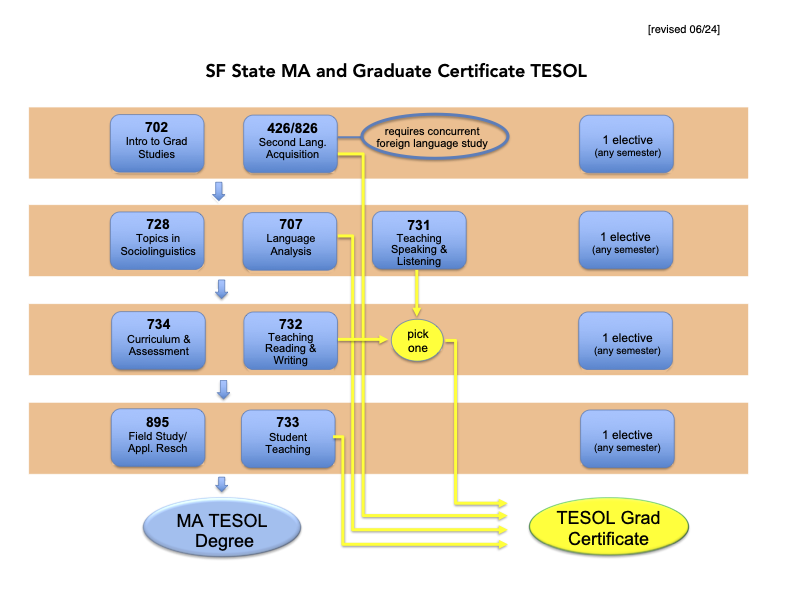
Pathways through the Program
Planning the overall trajectory of your M.A. studies? Please see the pathways through the program handout below which suggests semester-by-semester plans for completing the M.A. degree across various time spans, from 4-semester to 5-semester plans and starting the program in the Spring semester.
Pathways through the Program Handout (pdf)
Advising Checklist & Worksheet
Check out the Advising Checklist and Worksheet before you meet with your advisor.
Advising Checklist/Worksheet (pdf)
Availability of Courses
M.A. core courses are offered only during the fall and spring semesters. A few literature courses, and sometimes TESOL seminars, are offered during the summer session and the January winter session (see SF State course schedule).
Late sections (beginning at 4pm or later) are regularly offered for many courses. We make every effort to accommodate students who need late classes, but there is no guarantee that it will be possible to take all of the courses necessary to complete the M.A. program late in the day.
Because specific classes may be offered only once every two or three semesters, it is important to be aware of when they will be offered and to plan ahead.
Courses Recommended on Advisement
The TESOL program may recommend courses for some applicants in their first two semesters in the program. These course provide foundational work for some students who do not have the educational background, enough teaching experience or need academic support to be successful in TESOL graduate level work.
- ENG423: Language Analysis for Language Teachers (3 units): Introduction to English language structures and common English learner errors. Analysis of form, meaning and use in spoken and written texts, including academic genres. Focus on understanding cross-linguistic influences and strategies for responding to learner challenges in grammar and pronunciation.
- ENG 670: Writing for Graduate Studies in the Liberal and Creative Arts (3 units): Development of writing skills for graduate work in the Liberal and Creative Arts focusing on the kinds of writing needed in these disciplines. May not be used for master's degree ATC
- ENG 726: Practicum (3 units): For students who have less than 2 years of classroom teaching experience, through assignment as an apprentice or tutor, TESOL students gain experience with methods, materials, and procedures for teaching non-native speakers of English.
TESOL Program Foreign Language Requirement
The purpose of this requirement is to experience the learning of a language which is markedly different from one's native language. For native speakers of English, the foreign language must be a non-Indo-European language or an Indo-European language that differs considerably from English, such as Farsi or Hindi. American Sign Language (ASL) may also be used to fulfill this requirement. For non-native English speakers, English is considered to be the foreign language.
Native English-speaking students who enter the program already having proficiency in a non-Indo-European language will be considered to have fulfilled this graduation requirement. All non-native speakers of English, by virtue of pursuing graduate work in English, their foreign language, will have as well. Native English-speaking students who do not have proficiency in a non-Indo-European language may fulfill that requirement along with their required foreign language study for English 826 (see below).
English 826 Concurrent Foreign Language Requirement
One of the requirements for English 826 (Second-Language Acquisition) is that students study a foreign language concurrently in order to focus their attention on the language learning process. Regardless of their prior language study, all students must study a foreign language while they are taking English 826. Most native English-speaking students who enter the program without proficiency in a non-Indo-European language complete that graduation requirement by taking a non-Indo-European language as their foreign language for English 826. Native English-speaking students who already have proficiency in a non-Indo-European language may take any foreign language they like to fulfill the English 826 foreign language requirement. Non-native English speakers may take English 670 (Graduate Writing for TESOL) or a CMS (Composition for Multilingual Students) class to fulfill this language requirement.
Foreign language courses may be taken in junior colleges, private institutes, or extension divisions, as well as at SF State. Language courses may be taken on a credit/no credit basis or for a certificate of attendance. For courses taken off campus or in summer school, students should place an official grade report, a letter from the institution, or a memorandum from the English 826 instructor in their file in the English Department office.
List of non-Indo-European language courses which may be taken to fulfill the requirement.
Foreign language courses may be taken at SF State or at community colleges, private institutes, or university extension programs. Language courses may be taken on a credit/no credit basis or for a certificate of attendance. For courses taken off campus, students should place an official transcript, a letter from the institution, or a memorandum from the English 826 instructor in their file in the English Dept. office.
SF State
- ARAB 101: First Semester Arabic (also ARAB 102)
- AA S 171: Speak Vietnamese
- CHIN 101: First Semester Chinese (also CHIN 102, 103, etc.)
- FILI 101: First Semester Filipino
- HEBR 101: First Semester Modern Hebrew
- APN 101: First Semester Japanese (also JAPN 102, 103, etc.)
- PRSN 101: First Semester Persian • SPED 688: American Sign Language I
- SPED 689: American Sign Language II
Some off-campus programs
- San Francisco City College [Chinese, Japanese, Korean]
- UC Berkeley Extension [Arabic, Chinese, Japanese, Vietnamese], (510) 643-2604
- University of San Francisco [Chinese, Japanese, Hebrew], (415) 422-2802
- Soko Gakuen [Japanese: Beginning conversation, beginning-intermediate classes, including Saturdays], (415) 928-9608
- Japan Society [Beginning-Advanced Japanese], (415) 986-4383
- Nobiru Kai [Japanese], (415) 922-2033
- AISEI Japanese Language Services [Beginning-Advanced Japanese, 10-week classes], (415) 296-9295
- Intercultural Institute of California, Korean Studies Program [Korean], (415) 441-1884
- Pacific Arabic Resources [Arabic], (415) 644-0110
- Arab Cultural Center [Introductory, Intermediate and Advanced Arabic],(415) 664-2200
- A 10-week course, once a week for 3 hours in the evening. (Might not be offered at present)
- Vista College, Berkeley (510) 841-8431
- College of San Mateo
- ASL Café [a 60-minute ASL class along with ASL language practice one evening a week],contactpi@sfgov.org, (415) 242-5200
Advancement to Candidacy (ATC) and Proposal for Culminating Experience (CE)
Instructions and Forms
Students must file their Advancement to Candidacy (ATC) form during the semester immediately preceding registration for the final six units of the 30-unit program, that is, the semester before taking English 733 and 895. At the time they complete their ATC form, students must also complete a Culminating Experience (CE) form. The M.A. TESOL Culminating Experience is a Capstone Project which includes a Capstone Paper and Presentation.
You can download the ATC form from the Graduate Studies Current Student Forms page. Select "English-TESOL" from the menu. You can download a sample of the ATC form. Please download the CE form from the Graduate Studies Culminating Experience Procedures page. Download the "895: Field Study or Applied Research" version of the form.
Your CE form needs to include a brief description of your Capstone Project, so be sure to read the capstone guidelines and download the proposal form and then bring ideas for your project along with your draft forms to meet with a faculty advisor at least one month before your ATC and CE forms are due to the M.A. TESOL faculty. You can download a sample CE form. Follow these instructions for completing the CE form.
All students:
After you have completed your ATC and Culminating Experience forms (two forms), they must be checked by a M.A. TESOL faculty adviser. To do this, you must either attend the M.A. TESOL ATC review meeting (announced via list-serv at the beginning of the semester) or meet with your faculty adviser.
How to prepare:
- Borrow your file from the English Department office. Bring a copy of your unofficial transcript showing completion of course work. Once your ATC form is approved, your status will be changed from conditionally classified to fully classified.
- Bring both your completed ATC and completed Culminating Experience forms, and if needed, completed ATC Substitution and/or Transfer of Units form, to the meeting. (Thesis students should check with their thesis advisers regarding all the needed paperwork and deadlines.) If everything is evaluated as correct on the two forms at a review meeting, faculty will collect them and forward them to the English Department office for further processing. Copies will be made for your file in the department office, and you should eventually receive copies of signed and approved forms in the mail. If there are any errors, you will need to revise the forms and resubmit them for review.
If you still need to choose an Elective for the coming semester to include on your ATC form, see schedule for classes. Type in your most likely class. Should you later change your mind and take a course/courses different from the courses that you typed on the ATC (and that were approved), you will need to submit a Petition for ATC Substitution.
The Culminating Experience Form will be signed by 2 faculty members. In the event there is a change in your committee (for example if a faculty member who signed your form is on leave the semester you graduate), you will need to submit a Petition For Committee Revision.
Capstone Guidelines and Proposal Form
In preparation for your final semester, you must come prepared with ideas for your capstone project or the capstone proposal at the time you submit your ATC. Please see the following guidelines and download and fill in the proposal form to begin working on your capstone project. The capstone proposal is due Week 13 of the semester.
Grading Policy and Probation
Graduate Academic Policies and Procedures require that all graduate students maintain a minimum cumulative 3.0 (B) grade point average (GPA) and a minimum 3.0 (B) GPA for the 30 units of courses listed on the Graduate Approved Program (GAP) form.
Specific program policy is as follows (for more specific course information see SF Bulletin):
- The non-Indo-European language that accompanies English 826 may be taken on a credit/no credit basis or for a certificate of attendance.
- English 702, 707, 728, 731, 732, 734 and 826 must be taken for letter grades.
- English 733 and 895 are graded on a credit/no credit basis.
- Only one Elective course can be taken for credit/no credit.
- The passing grade for all core and concentration courses is B- (this is 80% and aligns with University policy and corresponds to the CR/NC option)
- Students whose cumulative GPAs drop below 3.0 (B) will be placed on probation.
- A course may be repeated only by a petition approved by the M.A. TESOL faculty.
Review SF State’s graduate academic standards.
The M.A. TESOL-required culminating experience is a Capstone Project (consisting of a paper and presentation), which is completed while taking English 895: Field Study or Applied Research Project
TESOL Capstone Project
Overview:
(For examples of past Capstone Project topics, see links to past TESOL Conference Web sites below.)
The TESOL Capstone Project (CP) provides students with an opportunity to demonstrate their in-depth knowledge and practical expertise in a specific area of the TESOL discipline, and to showcase their work through two formats: a 15-20 page academic paper, and a professional conference presentation. The Capstone Project, completed in the context of ENG 895, builds on work the students have completed for their TESOL coursework – for example, ENG 702 annotated bibliography entries; ENG 732 research project, ENG 734 curriculum project; ENG 731 lesson plans, among others (see sample CP scenarios below). CPs are meant to be opportunities for reflection, expansion, and meaningful revision of coursework which students view as central to their professional development. For this reason, in general, students are discouraged from launching brand-new projects in their final semester for their CP. In selecting a focus for their CP, students should be able to demonstrate how their CP builds on prior work in a meaningful and productive way.
Students’ CPs should be consistent with their career goals; a CP work should be viewed as a culminating display of ability, demonstrating that TESOL graduate is prepared to become a professional in the field of TESOL. The excellence in writing and oral presentation requirements reflect the competencies that are essential to success in the field of TESOL. The CP academic paper is intended to assess students’ familiarity with the rigors of writing for a professional audience in the TESOL field and the conference provides a venue for giving a professional presentation.
The CP is prominently featured in the student’s TESOL Portfolio; the reflection and expansion/revision work of the CP paper and presentation is carried out in the context of ENG 895, under consultation with the students’ faculty portfolio advisors and peers. The CP yields two products which are required components in the students’ TESOL Portfolio:
- An academic paper [15-20 pages] A paper that demonstrates your in-depth knowledge and practical expertise in a specific area of TESOL and may take on a variety of formats (e.g., an action research paper, a curriculum development plan, a theoretical essay, a grant proposal, a program assessment plan, among others). While the format, scope, and purpose of papers will vary, all papers are expected to include: discussion of actual ESL/EFL learning contexts, a solid review of relevant literature, and applications to classroom practice. Papers should also demonstrate students’ ability to write competently for a target audience of TESOL professionals, using logical argumentation, appropriate formal voice, and standard academic writing conventions.
- An oral presentation and handout for your end of semester professional conference presentation
Students are free to collaborate during the preparation of their CP work and are strongly encouraged to seek on-going peer input/critique. Students are also free to co-present at the conference, but each individual student must independently prepare a CP paper with a unique focus.
Websites from past English Dept. Conferences:
- Fall 2022 English Dept. Conference
- Spring 2022 English Dept. Conference
- Fall 2021 English Dept. Conference
- Spring 2021 English Dept. Conference
- Fall 2020 English Dept. Conference
- Spring 2020 English Dept. Conference
- Fall 2019 English Dept. Conference
Websites from past TESOL Conferences:
- Fall 2018 M.A. TESOL Conference
- Spring 2018 M.A. TESOL Conference
- Fall 2017 M.A. TESOL Conference
- Spring 2017 M.A. TESOL Conference
- Fall 2016 M.A. TESOL Conference
- Spring 2016 M.A. TESOL Conference
- Fall 2015 M.A. TESOL Conference
- Spring 2015 M.A. TESOL Conference
- Spring 2014 M.A. TESOL Conference
- Fall 2013 M.A. TESOL Conference
- Spring 2013 M.A. TESOL Conference
- Spring 2012 M.A. TESOL Conference
- Fall 2011 M.A. TESOL Conference
- Spring 2011 M.A. TESOL Conference
- Spring 2010 M.A. TESOL Conference
- Fall 2009 M.A. TESOL Conference
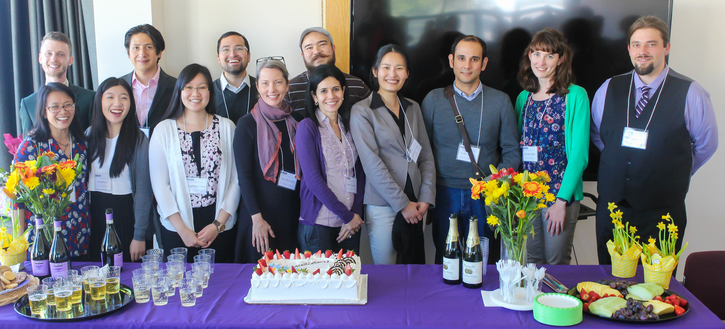
FAQs from New Students
If you are a prospective student, please view the M.A. TESOL Prospective Students FAQs here.
Orientation
At the Orientation for new students, you will have a chance to meet the M.A. TESOL Program Coordinator, some of the TESOL faculty, and fellow newcomers to the program. The Orientation covers a number of important topics, including:
- Explanations of core M.A. courses and TESOL concentration courses
- Suggested course loads and combinations of courses
- Long-range planning of your program
- Getting tutoring and teaching experience
- Communications, advising, and places to know about
New students should try not to miss this very important meeting. If you do have to miss it, contact the Coordinator to get a summary and copies of handouts that you missed.
The Orientation is held at the beginning of each semester, just before classes begin. New students who live in the Bay Area will also have a chance to attend an Orientation at the end of the semester before they enroll.
First Semester Classes
Most M.A. TESOL students are admitted conditionally and take core or foundational classes during their first two semesters. Check your admission letter from the English Department to see which courses are listed under “Conditional Admission.”
Most M.A. TESOL students register for the following classes their first semester: English 702 (Intro to Grad Studies), English 826 (Second Language Acquisition), and a concurrent foreign language (usually a non-Indo-European language for native English speakers and English 670 for non-native speakers of English). In addition, some full-time students may take English 726 (Practicum - less than 2yrs teaching) and or English 423 (Language Analysis for Teachers).
Registering for Courses
You can sign in and register for classes, as well as access your grades, class schedule, unofficial transcript, test score report, financial statement and more, at SF State Gateway. If you do not have an SF State password, you can request one using the SF State password service.
See explanations of Registration policies and procedures and Registrar’s information, dates, and deadlines. You can find out your Priority Registration date and time online at SF State Gateway.
You must pay fees first, and remove any holds, in order to register. If you have problems, you can call the Registration Helpline at (415) 338-3333 or get help at the One Stop Student Services Center in the Student Services Building (phone: (415) 338-2350).
To get your first choice of sections, register for classes on your Priority Registration date or during any Open Registration period after that date. Open classes can be found by doing an online search of the class schedule.
If a class is full, try to register for a different section, or try to get on the waiting list. During the first week of class, faculty will make every effort to admit M.A. TESOL students who need to take prerequisite classes, so don’t worry. You can add classes during the first week, when other students drop out.
The English Department can make no guarantee of admission to classes. There is an upper limit on the number of students permitted in each class, and, if the minimum enrollment is not met, the class will be canceled. For these reasons, and to guarantee yourself a spot in a class, it is important to register during Early Registration and Priority Registration.
Transferring Credits
You can read more about transferring credits under the M.A. TESOL admissions section on the left of this page.
You can also view the Transfer Unit Evaluation Form (pdf) from the Division of Graduate Studies website.
Academic Advising
Advising is central to the program. Students in need of advising have a number of options:
- Review the extensive advising information on our program website.
- Contact your assigned faculty member and set up an appointment. Advice may be given in person, via email, or over the phone.
- Come to sessions held on Advising Days. Advising Days provide current students with the opportunity to meet with faculty and attend various information workshops.
- Current students in the M.A. TESOL Program can view the advising section for additional forms that will help with the Portfolio and Capstone preparation process.
- For serious academic concerns, including academic probation, please contact the program coordinator (matesol@sfsu.edu)
Find your faculty advisors here:
- If your last name begins with A-L, please see Dr. Santos, Dr. Kohls or Dr. Olsher
- If your last name begins with M-Z, please see Dr. Abeywickrama or Dr. Olsher
Checking Your SF State E-mail Account Regularly
All students at SF State receive a free e-mail account with an @mail.sfsu.edu address. This is the official e-mail address that the University will keep on record for you, and the University will use this address to send you important information. If you do not plan to use your SF State account on a regular basis, be sure to arrange to have e-mail forwarded to an account that you do use regularly so that you will not miss important messages from the University.
To read more about SF State e-mail accounts, including how to get e-mail forwarded and how to re-set your password, see the email guide page at the SF State Tech Central site.
Child Care
San Francisco State University has two child care facilities on campus which are open to faculty, staff, and students, the Associated Students’ Early Childhood Education Center, and SF State Children's Campus.
Housing
Housing information is provided by the SF State Housing Office.
Students wishing to live on campus should check out the University’s housing options early, and are strongly encouraged to fill out a housing application before being admitted to the University. Unfortunately, SF State cannot guarantee housing to newly admitted students. Applications are accepted on a first-come, first-served basis.
Graduate students may obtain additional specialization by adding one or more certificates to their degree program:
- Certificate in Immigrant Literacies
- Certificate in Teaching Composition
- Certificate in Teaching Post-Secondary Reading
- Certificate in Computational Linguistics
Please also check out M.A. TESOL's Experience & Careers and Community Service & Research.
Current Students
- SF State Grad Division: New Student Information
- TESOL M.A. Degree Requirements
- Experience & Careers
- Community Service & Research
Prospective Students
- Program Learning Outcomes
- Division of Graduate Studies
- Application Materials
- Fees and Expenses
- Funding your Education
- Applicants from Western Regional States
- International Applicants
- Deadlines
Professional Resources
- TESOL International Association: the annual conference is the largest professional development event in the TESOL field.
- CATESOL: a professional organization serving Teachers of ESOL in California and Nevada.
- Literacy Education and Second Language Learning for Adults (LESLLA): promotes, on a worldwide, multidisciplinary, and multilingual basis, the sharing of research findings, effective pedagogical practices, and information on policy.
- Applied Linguistics Association of America (AAAL): a professional society of scholars interested in a broad range of real-life language-related issues and the underlying social and material conditions
Current Student Checklist
Obtaining Classified Status
Students admitted with Conditionally Classified status normally obtain Classified status after Graduate Division reviews and approves the Advancement To Candidacy (ATC). Under certain circumstances, you may wish to obtain Classified status before filing the ATC. If you have met the conditions outlined in your Notice of Admission, contact your department office about the procedure for changing your status from Conditionally Classified to Classified. If your program requires you to provide evidence that you have met these conditions, bring proof of completion (such as a transcript) to the department office and ask that it be added to your file.
Semester Before Taking English 895
Submit your Advancement To Candidacy (ATC)
- Use this form to describe how you will fulfill the requirements of your degree.
- The Graduate Coordinator of the M.A. Composition Program will guide you through the process of preparing and submitting your ATC. Prepare the ATC form online before printing. If necessary, print out a blank copy and type in the information. If the form is handwritten, it will be rejected by Graduate Division.
- Submit your ATC to the department office.
Submit your Proposal for Culminating Experience (CE) and your Protocol Approval Form (PAF)
- The Graduate Coordinator of the M.A. Composition Program will guide you through the process of preparing and submitting both your Proposal and the paperwork related to obtaining Protocol Approval for conducting research with human subjects.
- You will use the Proposal form "895: Thesis with Human/Animal Subjects"; include the title of your thesis and a brief abstract, and list the members of your thesis committee, all of whom must sign the form. Your "committee chair" is your first reader.
- Prepare your Proposal form online before printing. If necessary, print out a blank copy and type in the information. If your Proposal is handwritten, it will be rejected by Graduate Division.
- Submit your Proposal and your Protocol Approval paperwork to the department office.
Do you have questions about the ATC, Proposal for Culminating Experience, or Protocol Approval Form? Ask in your department office, consult with your advisor, or visit the Graduate Division website. Note that we prefer that you submit your ATC and Proposal forms and your Protocol Approval paperwork to the department office at the same time.
Semester of Graduation
Enroll in ENG 895
- Your ENG 895 instructor will give you a permit number to use for adding the class online.
Apply for graduation
- The deadline to apply for graduation is the 4th Friday of the semester.
- The graduation application is available on the Division of Graduate Studies website.
Check your transcript
- Complete any necessary paperwork to change Incomplete grades.
Submit your thesis to Graduate Division
- The usual deadline is the last day of classes.
- Check the requirements for thesis formatting and submission in advance on the Division of Graduate Studies website.
When Graduation Is Delayed
Re-apply for graduation
- If you do not graduate during the semester in which you initially enrolled in 895, you must re-apply for graduation in the semester in which you will complete your requirements.
Maintain enrollment status
Students admitted before Fall 2008
- If you do not submit your thesis by the deadline, your instructor will assign you a grade of ‘RP’ (report in progress).
- You do not need to re-register for ENG 895 in subsequent semesters.
- You do not need to pay fees for subsequent semesters.
Students admitted beginning Fall 2008
- Graduate students who earn RP in ENG 895 have an additional “grace semester” after the posting of the RP grade to continue writing the thesis. To maintain current status during this grace semester, students do not have to pay fees or register for courses.
- If students do not graduate at the end of the grace semester, they must enroll in a 0-unit Culminating Experience course via the College of Extended Learning for each subsequent semester.
Check your transcript
- When you submit your thesis to your readers, you must also provide your 895 course instructor with a Petition for Grade Change.
- Fill in your name, SF State ID#, and the semester of enrollment in ENG 895; your professor will note that the RP grade should be changed to CR and will submit the petition to the department.
Note your seven-year deadline.
If you do not graduate during the semester of your initial enrollment in your culminating experience course, we recommend that you remain mindful of your seven-year deadline. Your degree must be awarded within 7 years from the start of the term of the earliest course listed on your ATC. EXAMPLE: if the earliest course listed on your ATC was taken in the Spring 2008 semester, you must graduate no later than the January, 2015. Students whose deadline has expired must petition for an extension of the seven-year limit; such an extension may be granted only once.
For more information contact:
Department of English
San Francisco State University
1600 Holloway
San Francisco, CA 94132
(415) 338-2660
Inquiries concerning admission to the university, application forms, the university Bulletin, financial aid, etc. should be addressed to:
Graduate Studies Division, ADM 250
San Francisco State University
1600 Holloway Avenue
San Francisco, California 94132.
Graduate Division
(415) 338-2234
